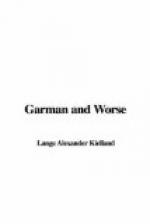Madeleine took a few steps to and fro in the room, and then went to the door. As she stood on the stone steps under the porch, she could see down into the little harbour, and her eye could follow the path which led across the flat meadow, and up across the steep slope as far as the lighthouse. There lay her old home, with its solid stone walls, and the lantern with its red-painted cover. She turned away: the sight was more than she could bear. Her ear now caught the sound of Per chopping the wood in the peat-shed, and almost without knowing what she did, she found herself in the shed, standing by his side. He ceased for a moment from his work, raised himself up, and looked beyond her over the sea. Per wore a stiff sailor’s beard, and his face had grown older and coarser with the lapse of time, but still every feature was familiar to her. Madeleine made a step towards him and endeavoured to take his hand. In this she was unsuccessful, for he drew it away from her. She could no longer command her feelings, and, throwing her arms round his neck, she laid her head on his breast.
Delphin’s remark was perfectly true about the mixture of fish, tobacco, and damp woollen clothing; but she felt that this was her place, and here she ought to rest. At that moment, too, she perceived why the pang had passed through her heart when she met Per’s wife. She envied her everything. Husband, home, even her very existence,—all belonged to her. Here was her place, and here the man she loved and understood. Oh, how all her so-called friends had mocked and deceived her! What a life was hers!—a life which consisted only in being the wife of a man she did not love, in keeping his house, and bearing his children, surrounded on every side by an unwholesome atmosphere of form, ceremony, and selfishness.
Closer and closer she clung to the broad breast whereon she lay, and that heart, so well drilled and confined, ran over in one supreme moment of mingled happiness and anguish, while the recollections of her youthful love passed through her sobbing heart.
“It was not my fault—it was not my fault!” she repeated plaintively, like a child who has had the misfortune to break something.
He lifted his hard heavy hand, and laying it on her head, passed it gently over her hair. Now he understood it all, but not a word passed his lips.
“Lena, Lena!” cried the pastor from the door, “you must come and see what I have found. Here are twins. Lena, Lena! where are you? Make haste! What a good wife! Just think, twins the first time!”
It was not easy to tell what Per’s thoughts were as he stood again alone looking over the sea. Thus had the billows rolled to and fro in storm and sunshine, whilst he had waited and waited. And this was what he had waited for! He drew a long breath, and his face seemed to grow clearer again as he slowly nodded his head several times towards the ocean.
Per’s wife made many apologies, as is but right and proper on such occasions, for the repast, which, however, consisted of coffee, with cream and sugar, bread and butter and cakes, and lastly a dish of small lobsters. She insisted that it was a shame to offer such small lobsters to her guests. It was a pity they had not some larger ones.




